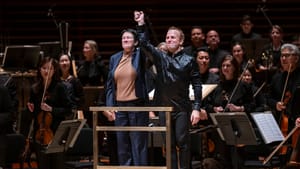Stay in the Loop
BSR publishes on a weekly schedule, with an email newsletter every Wednesday and Thursday morning. There’s no paywall, and subscribing is always free.
Homegrown classical
The Philadelphia Orchestra presents Sibelius, Higdon, and Tchaikovsky

Jennifer Higdon gave the Philadelphia Orchestra a precious gift with her Concerto for Orchestra, which premiered in 2002. The Pulitzer Prize-winning composer, a former Curtis Institute professor, tailored movements to directly reflect the ensemble’s core sound. Several passages highlight certain sections—and in some cases, even individual players.
Now based in North Carolina, Higdon was back in Marian Anderson Hall when the orchestra took up her magnum opus on Friday, October 24, the first time in 14 years. Yannick Nézet-Séguin, who led the last local performances in 2011, was on the podium once more. And many of the players who participated in the work’s debut were still in their seats. It was a magical music-making experience.
Other orchestras have adopted Higdon’s raucous, thrilling smorgasbord, and with good reason. But Philly’s proprietary stamp is all over the piece. You hear it in the second movement, scored only for strings, which shows off everything these musicians can do, from tense pizzicato to lush, vibrating clusters. You hear it in the winsome flute solo written for Jeffrey Khaner—who played it beautifully on Friday—that develops into a conversational volley among the woodwinds. You especially hear it in the jaw-dropping fourth movement that pushes the percussion to its flawless limit.
Nézet-Séguin turned up the volume when necessary, but he never sacrificed detail or narrative progression on the altar of sonic thunder. Well-deserved standing ovations greeted him and Higdon after the last note sounded.
Sibelius and Tchaikovsky
The concert began with Lisa Batiashvili joining Nézet-Séguin and the orchestra for the ever-popular Violin Concerto of Jean Sibelius. Batiashvili’s lush, forward tone suited this expressive music well, swelling effortlessly above the orchestral complement even at full tilt in the opening Allegro moderato movement. She brought a refined quietude to the central Adagio and a fiery, spirited style to the finale. As an encore, she enlisted Nézet-Séguin and the string players for a lovely, reflective version of the traditional Abendlied, arranged by Jarkko Riihimäki.
Tchaikovsky’s symphonic poem Francesca da Rimini—also returning after a 14-year absence—lacked a certain narrative thrust. Rhythms tended to slacken, although this was understandable, coming directly on the heels of the demanding Higdon piece. Nézet-Séguin conveyed the power and fury of Hell, but details suffered. Still, there were pleasures to glimpse: none more so than the gorgeous clarinet solo representing the title character, a denizen of Dante’s Inferno, performed evocatively by Ricardo Morales.
What, When, Where
Sibelius, Higdon, and Tchaikovsky. Jean Sibelius, Violin Concerto; Jennifer Higdon, Concerto for Orchestra; and Pyotr Illyich Tchaikovsky, Francesca da Rimini. Conducted by Yannick Nézet-Séguin. Lisa Batiashvili, violin. Philadelphia Orchestra. October 24-26, 2025, at Marian Anderson Hall, 300 S Broad Street, Philadelphia. (215) 893-1999 or philorch.org.
Accessibility
Marian Anderson Hall is a wheelchair-accessible venue.
Sign up for our newsletter
All of the week's new articles, all in one place. Sign up for the free weekly BSR newsletters, and don't miss a conversation.

 Cameron Kelsall
Cameron Kelsall